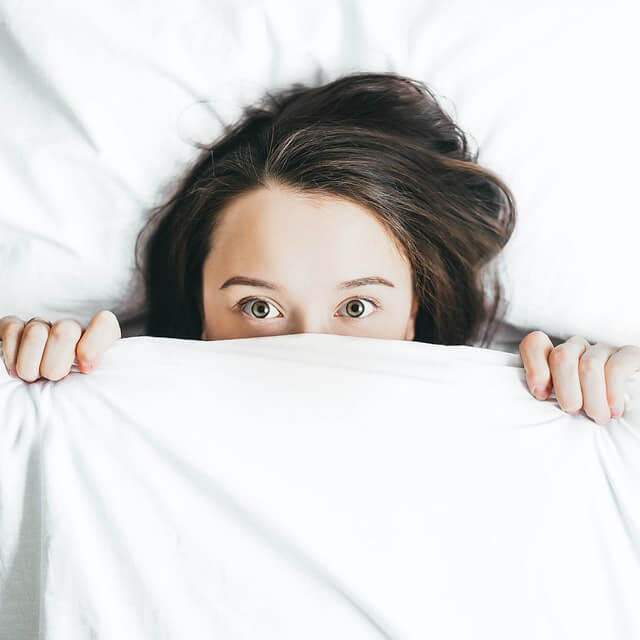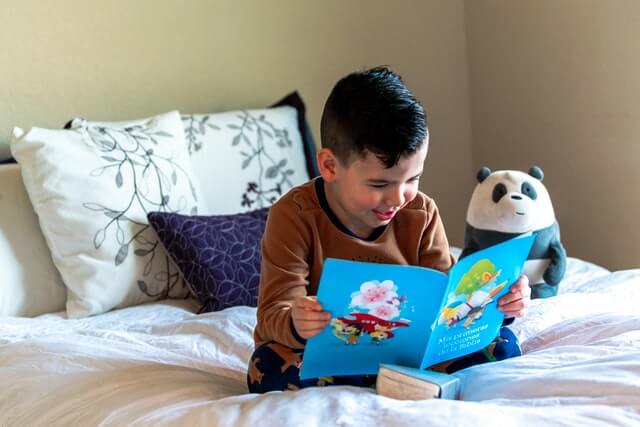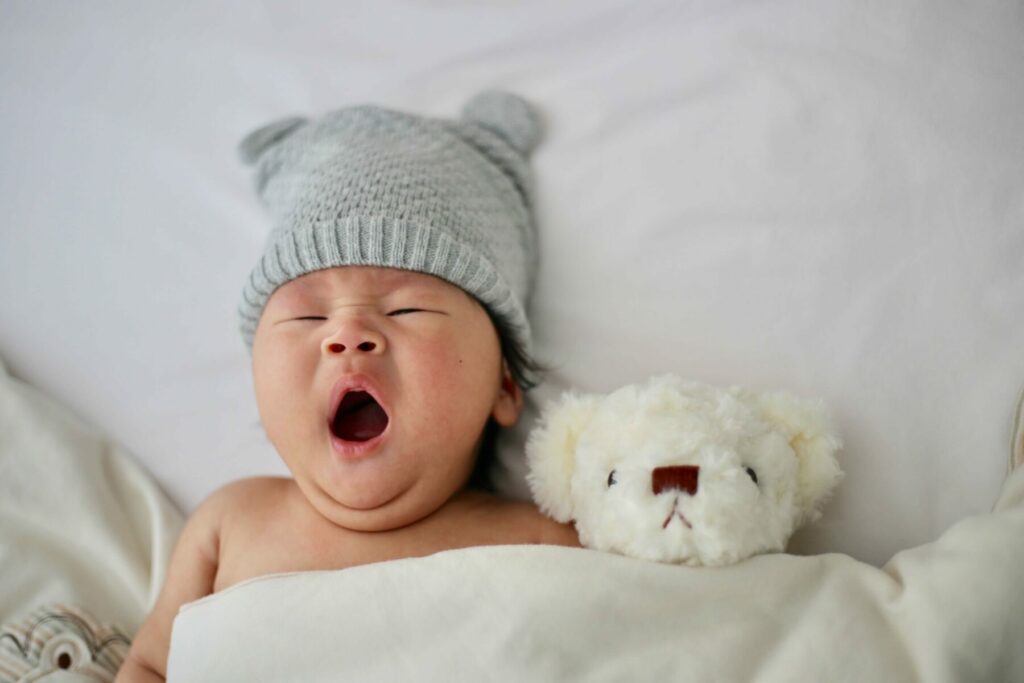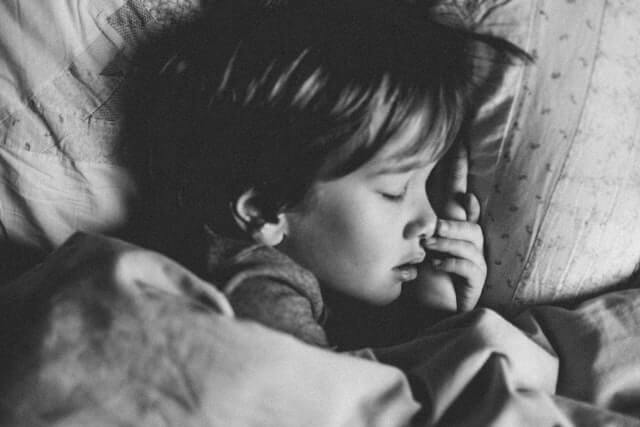It is common for young children to struggle with falling asleep and staying asleep. That being said, some children, such as autistic children, are more prone to experiencing these kinds of problems than others. In this guide, we will go through different factors which may affect an autistic child’s sleep, what you can do as a parent or guardian to help, and what products may help support their sleep routine.

Factors that Affect an Autistic Child’s Sleep
It is not uncommon for autistic children to struggle with sleep issues. There are different factors which may cause these issues, including the time at which they go to bed, what they do before they go to bed, where they sleep, and what they do during the day.
Tips for Making an Autistic Child’s Bedtime Better
There are different ways to help improve your child’s sleep cycle. In this portion of the guide, we will go through different tips to help your child get to sleep at night and feel better rested throughout the day.
Set Up a Bedtime Routine
Having a specific bedtime routine for your child to follow every night has been proven to promote positive sleep cycles. According to one peer-reviewed study, a stable bedtime routine is important not only for “healthy sleep, but also for broad development and wellbeing in early childhood.”
There are different ways to set up a bedtime routine for your child. For example, taking a bath, brushing teeth, and reading a fun book with your child every night before they go to sleep may help promote restful sleep. By repeating these activities consistently, your child will begin to associate them with bedtime, making the transition to sleep easier.
As part of a daily routine for your child before going to sleep. It is equally important to maintain consistency for the routine to work and help your child sleep. Another effective tool to add to a sleep routine is to remind your child at different intervals how close to bedtime they are, such as 30 minutes, 15 minutes, 5 minutes, and the like.
Keep Naps Early and Short
Long naps in the afternoon can make a regular bedtime especially difficult for your child as they may not feel fatigue until later in the night. In order to avoid this, it is important to keep naps short and early in the afternoon so that your child may comfortably go to sleep at their regular bedtime.

Figure Out How Much Sleep Your Child Needs
Depending on their age, your child will need different amounts of sleep. According to the United Kingdom’s National Health Service (NHS) official website, including naps, children between one and two years old require 11 to 14 hours of sleep, those three to five years old require 10 to 13 hours, and children six to twelve require 9 to 12 hours.
Avoid Screens Before Bedtime
A growing amount of research has shown that screens such as smartphones and tablets have a negative effect on sleep when used right before bedtime. According to one study published in the Child and Adolescent Psychiatric Clinics of North America journal, the increasingly widespread use of electronic screens has led to “delayed bedtime and/or decreased total sleep time” which in turn can have negative psychological effects on the person’s psychological and physical wellbeing.
Set Up an Environment Where Your Child Feels Safe
It is important for your child to feel safe and secure at night so they can sleep well. If certain decorations are anxiety-inducing for them, removing them may help them feel safer. Having their favorite toys and blanket with them can help them feel more comfortable as they go to sleep.
Why do Autistic Children Have Difficulty Sleeping?
It has been shown that children with autism are more likely to suffer from sleep problems such as insomnia, frequent awakening, and daytime sleepiness, than children who do not have autism. Sleep problems in children with autism may be due to “genetic, environmental, immunological, and neurological factors.”
These may also be caused by problems with melatonin releasing, as well as increased anxiety due to heightened sensitivity to external stimuli during the day which may disrupt the ability for the child to fall asleep and stay asleep throughout the night.
Other Ways to Improve an Autistic Child’s Sleep
Along with a better sleep routine, avoiding screens before bedtime, and avoiding long and late naps, there are certain products which may help promote better sleep for an autistic child. These include blankets, sound machines, and special sleepy time pillows.
Blankets for Autistic Children
Weighted blankets are therapeutic blankets which are heavier than regular blankets and may help people living with sleep deprivation, anxiety, autism, and depression. For the best weighted blankets, we recommend the:
Weighted blankets can also be custom-made to perfectly adapt the child’s weight. Weighted blankets should never be used by a child under the age of one.

Other Products to Help an Autistic Child Sleep
There are other products to consider for your child if they are autistic and suffering from sleep problems. On the Autism Products website,you can find a long list of products specifically designed and adapted to autistic children’s needs. These include:
- Autism Product ROHM Portable White Noise Sound Machine
- Autism Product ZPod Autism Bed
- Autism Product Sleepy Time Pillow
There are many different products available on the market to help autistic children sleep. It is important to speak with a medical professional before purchasing these products to make sure that they are 100% safe and beneficial for your child.
Can ABA therapy help a child sleep?
Yes, Applied Behavior Analysis (ABA) therapy can potentially help a child with autism improve their sleep patterns. Many children with autism struggle with sleep issues and these can have a significant impact on their behavior, learning, and overall quality of life.
ABA therapy uses positive reinforcement to encourage desired behaviors and reduce or eliminate unwanted behaviors. This approach can be applied to sleep problems by establishing a consistent bedtime routine, teaching relaxation techniques, and reinforcing staying in bed throughout the night.
For example, an ABA therapist might work with a child to develop a predictable and calming bedtime routine that includes activities like reading a book or taking a warm bath. The child would then receive positive reinforcement for following this routine and staying in bed.
Additionally, ABA therapy can help address other behaviors that might be contributing to sleep issues. For instance, if a child engages in stimulating activities before bedtime, an ABA therapist can help them understand the connection between these activities and their difficulty sleeping, and guide them towards more sleep-friendly alternatives.
However, it’s important to note that while ABA therapy can be effective for many children with autism, its effectiveness can vary from person to person. Each child’s sleep issues are unique and may require a tailored approach.
In conclusion, ABA therapy can be a valuable tool in helping children with autism improve their sleep, but it should be used as part of a comprehensive treatment plan that addresses the child’s overall needs.
Conclusion
There are many different factors which may negatively affect an autistic child’s sleep. As a parent or guardian, it is important to take the time to identify what may help your child sleep and what you can do to help. If you are unsure or have additional questions, make sure to contact a medical professional to get the best possible information regarding your child’s sleep cycle and difficulties.








